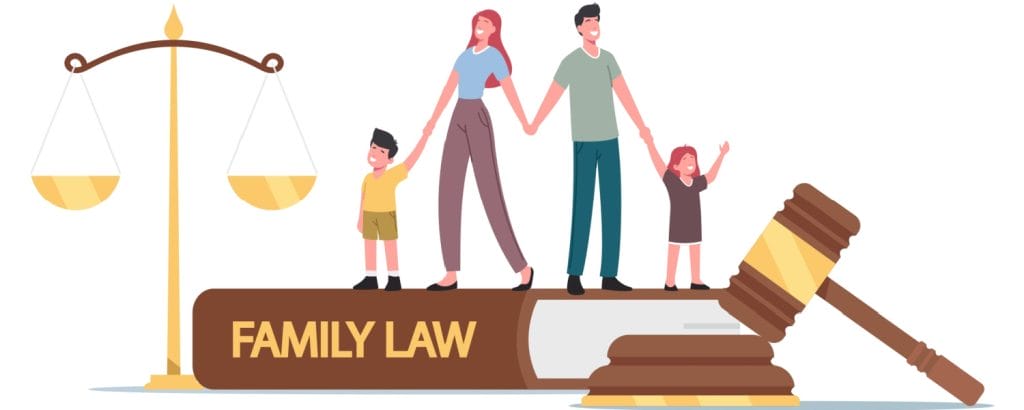Divorce can be a challenging and emotionally charged process, often associated with lengthy legal battles and stress. Many clients are worried about the timeline and often ask during initial consultations “how long does an uncontested divorce take in Illinois?” These fears are well founded. Everyone has heard horror stories of divorces that take years to be finalized.
However, in cases where both parties can come to an agreement on key issues, an uncontested divorce can provide a smoother and more expedited route to dissolution. If you’re considering an uncontested divorce in Illinois, it’s essential to understand the process and the factors that influence its duration.
Uncontested Divorce: A Quick Overview
First it is important to understand the difference between a contested divorce and an uncontested divorce. An uncontested divorce is a divorce in which both spouses agree on major issues such as property division, child custody, child support, and alimony. Since there is no dispute to resolve, an uncontested divorce generally proceeds more swiftly than a contested divorce, a divorce in which couples do not agree on major issues.
In Illinois, the relevant statutes for divorces can be found primarily in the Illinois Marriage and Dissolution of Marriage Act (750 ILCS 5/), which outlines the legal framework for divorce in the state. Every state will have something similar so make sure to check the laws in your state in case of any differences. Talking to a qualified attorney in your area is always recommended when you have questions.
If you want to learn more about Family Law vs Divorce in Illinois, click the link.
Residency Requirements
Before filing for divorce in Illinois, at least one spouse must meet the residency requirement. Either the petitioner (the spouse initiating the divorce) or the respondent (the other spouse) must have lived in Illinois (or your county) for at least 90 days before filing. This requirement ensures that the divorce is filed in a jurisdiction that has proper legal authority over the case.
Filing the Petition
The uncontested divorce process in Illinois begins with filing a Petition for Dissolution of Marriage. This document formally initiates the divorce proceedings and outlines the basic information about the marriage and the grounds for divorce. Illinois is a no-fault state, meaning there does not need to be a specific act committed against either party before they can file for divorce. Grounds for divorce in Illinois include irreconcilable differences, which means that the marriage has broken down beyond repair.
The petitioner files the petition with the circuit court in the county where either spouse resides. This marks the official start of the divorce process. Once the petition is filed, the court issues a summons to the respondent, and you must serve this to the respondent through a third party, notifying them of the divorce and providing them with 30 days to respond.
Often, in an uncontested divorce, couples will file the petition jointly. If both parties agree to the terms of the divorce then they can file the petition together and give that to the court. At this point service would be unnecessary. Service is often one of the harder parts of a divorce, but clear and open communication between you and your spouse will speed up the process.
To learn about filing a petition for divorce in a contested divorce, check out our article “Does It Matter Who Files for Divorce First in Illinois?”
Waiting Periods
Illinois law imposes a mandatory waiting period before a divorce can be finalized. This waiting period serves as a cooling-off period to allow spouses to reconsider their decision and potentially reconcile. In Illinois, the waiting period is typically 90 days from the date the respondent was served with the divorce papers or filed an appearance in court, whichever occurs first.
It’s important to note that this waiting period is a minimum requirement, and the actual duration of the divorce process can extend beyond this period due to various factors like litigation. If your divorce is uncontested, however, the waiting period may be the longest part of the divorce.
Reaching Agreements
The heart of an uncontested divorce lies in the ability of both spouses to agree on the key aspects of their separation. These agreements cover issues such as:
Division of Marital Property: Illinois is an equitable distribution state, meaning that marital property is divided fairly but not necessarily equally. Spouses are encouraged to negotiate and agree on how to divide their assets and debts.
Child Custody and Visitation: If the couple has children, they must decide on the allocation of parental responsibilities (formerly known as child custody) and a parenting plan that outlines visitation schedules and decision-making authority.
Child Support: The spouses must also determine child support payments based on Illinois guidelines, which take into account factors like each parent’s income and the number of children. Check out the Illinois Child Support Estimator to figure out how much those payments may be.
Spousal Maintenance (Alimony): If one spouse is seeking spousal support, they must agree on the amount and duration of payments. If you do not come to an agreement, the court may make the decision for you.
Reaching these agreements can significantly expedite the divorce process. However, negotiating and finalizing these arrangements can take time, particularly if there are complex financial or child-related matters to address. If you and your spouse both agree that a divorce is necessary, then sitting down to talk about these matters before filing can speed the process up greatly and save you money. Communication is important and often is the first thing to break down when a divorce is coming, making conversations regarding serious topics often difficult. But, it is important to have these conversations because it can save you, your spouse, and your children time, money, and stress throughout the divorce process.
Finalizing the Divorce
Once the agreements have been reached and documented, the court reviews them to ensure they are fair and in compliance with Illinois law. The court may request additional information or modifications if necessary. Judges reserve the right to change the agreement, often altering agreements to be in the best interest of the children. When the court is satisfied with the agreements, a Judgment for Dissolution of Marriage is entered.
The spouses will receive a copy of the judgment, marking the official end of their marriage. It’s important to note that the waiting period discussed earlier is included in the time it takes to finalize the divorce. Therefore, if the waiting period is met and the agreements are in place, the divorce can be finalized soon after.
Factors Influencing the Timeline
While the process of an uncontested divorce in Illinois is generally faster than a contested one, several factors can influence the timeline:
Completeness of Agreements: If the spouses are able to quickly and effectively come to agreements on all major issues, the process will move more swiftly. Delays can occur if there are disagreements that require additional negotiation or court intervention.
Court Docket: The availability of court dates and the court’s caseload can affect how soon your case can be heard and finalized. Courts may experience delays due to high demand or other logistical issues. Courts have a lot to juggle and often schedule hearings several weeks (sometimes months) apart depending on the issue.
Document Preparation: Accurate and comprehensive documentation is crucial. If there are errors or incomplete information in the paperwork, it can lead to delays as the court reviews and requests corrections.
Complexity of Assets: If the marital estate is complex, including businesses, multiple properties, or significant financial holdings, the process of dividing assets may take longer.
Mediation: Mediation is an alternative to traditional divorce proceedings. Mediation utilizes a nuetral third party mediator that works with both sides to come to an agreement. If you and your spouse are able to communicate well, mediation can allow you to create a custom agreement that can be taken to the court for approval. Depending on how quickly you can agree on different issues, mediation can be the fastest method for divorce. To learn more check out our soon to be published article “What Are The Benefits of Divorce Mediation?”
Conclusion: How Long Does an Uncontested Divorce Take in Illinois?
While the timeframe for an uncontested divorce in Illinois can vary depending on individual circumstances, the streamlined nature of this process generally allows for a quicker resolution compared to contested divorces. If everything runs as smooth as is possible then an uncontested divorce could be finalized at the end of the waiting period of 90 days. This is not usually the case, but due to the large amount of variables that must be worked on by you and the court, the entire process usually takes longer including preparation, filing, and waiting for finalization.
The key to expediting the process is effective communication, cooperation, and reaching agreements on the major issues. Consulting with a qualified attorney can provide guidance and ensure that the necessary legal steps are followed accurately, ultimately helping you navigate the path to a new chapter in your life.
MEET WITH AN ILLINOIS FAMILY LAW ATTORNEY TODAY
The Family Law attorneys at Koth Gregory & Nieminski understand that your family is the top priority, which is why we offer SAME-DAY APPOINTMENTS. If you need a divorce or other family law services, you can schedule your first meeting through our online appointment calendar. We look forward to meeting you.
Disclaimer: This article (How Long Does an Uncontested Divorce Take in Illinois?) may contain information that is outdated as Illinois law continuously evolves. Meeting with an experienced family law attorney is the best way to ensure you are receiving the most current information regarding How Long Does an Uncontested Divorce Take in Illinois?
Published by Dustin Koth on March 22, 2024





